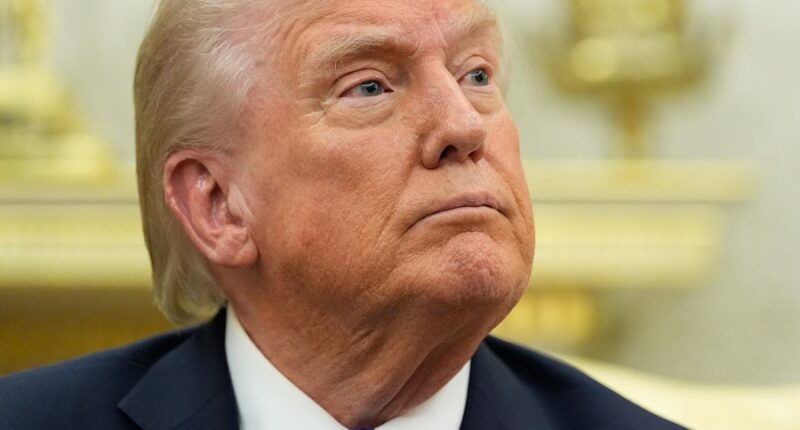Share this @internewscast.com

President Trump’s recent series of audacious moves is testing the boundaries within the Republican Party, revealing where some GOP members are willing to draw a line on certain key issues.
Concerns have arisen among Republicans from agricultural states regarding Trump’s proposal to import beef from Argentina. This comes at a time when U.S. cattle ranchers are grappling with economic challenges, raising alarms about the potential impacts on the domestic industry.
In another instance, New York Republicans voiced opposition to Trump’s decision to pardon former Representative George Santos, who had been incarcerated on fraud charges. Additionally, some party members have expressed discomfort with Trump’s discussions of a substantial financial settlement with the Justice Department, related to past investigations into his actions.
Despite these tensions, Trump and the Republican Party have largely presented a united front on the issue of the government shutdown. They maintain that any negotiations with Democrats will only commence once the government is reopened. Interestingly, as the shutdown approaches the one-month mark, Trump’s approval ratings have seen a slight increase.
Nevertheless, the president’s actions are placing some Republicans in difficult positions, particularly as he bypasses a typically compliant GOP majority in Congress to advance much of his agenda.
“This is not the Republican Party, this is the Trump Party,” remarked Matt Terrill, a GOP strategist and managing partner at Firehouse Strategies, highlighting the significant influence Trump exerts within the party.
“You’re seeing a few Republicans out there weigh in and have views. You’re going to see that. That’s not uncommon, but nothing has changed here,” he added. “Nothing has changed the fact that this is Trump’s party.”
The biggest break between Trump and typically supportive GOP lawmakers came this week when the president told reporters aboard Air Force One he was looking to import beef from Argentina.
The idea prompted pushback from typically quiet or supportive lawmakers, who argued it would hurt American cattle ranchers and do little to drive down prices.
“This isn’t the way to do it,” Senate Majority Leader John Thune (R-S.D.) said of Trump’s idea. “It’s created a lot of uncertainty in that market. So I’m hoping that the White House has gotten the message.”
Sen. Deb Fischer (R-Neb.) posted on social media that she had expressed her “deep concerns” to the administration about importing beef from Argentina.
“Bottom line: if the goal is addressing beef prices at the grocery store, this isn’t the way,” Fischer said. “Right now, government intervention in the beef market will hurt our cattle ranchers.”
Sens. Steve Daines (R-Mont.) and John Curtis (R-Utah) also publicly pushed back on Trump’s proposal. And the National Cattlemen’s Beef Association warned the government was undercutting them.
Trump and the White House appeared unmoved. Trump posted on social media calling on cattle ranchers to lower their prices while defending his implementation of tariffs. Press secretary Karoline Leavitt argued increasing the beef supply would help drive prices down, a sign Trump was not backing off the idea of importing from Argentina.
While the beef imports marked a major policy disagreement, some Republicans have also pushed back on Trump’s personal and personnel decisions in recent days.
Some GOP senators were uneasy about Trump reportedly demanding the Department of Justice (DOJ) pay him $230 million in compensation in connection to investigations into his conduct during previous administrations. Trump himself confirmed he was seeking money but said he did not know the exact figure.
Sen. Thom Tillis (R-N.C.), who is retiring at the end of his term, said Wednesday that the political “optics” of Trump receiving a windfall payment from the DOJ raise “concerns,” particularly during the shutdown, which has forced federal workers to go without pay.
Sen. Susan Collins (R-Maine) called the arrangement “very irregular.”
While GOP senators have mostly been deferential to Trump on his nominees, confirming controversial Cabinet picks such as Defense Secretary Pete Hegseth and Health and Human Services Secretary Robert F. Kennedy Jr., enough Republicans took issue with racist comments made by Paul Ingrassia that he was forced to withdraw his nomination this week to be the head of the Office of Special Counsel.
In the House, Trump’s decision to pardon Santos, the former New York Republican congressman who was convicted on fraud charges, struck a nerve with some New York Republicans who are likely to face tough reelection bids in the midterms in swing districts.
“George Santos is a convicted con artist. That will forever be his legacy, and I disagree with the commutation,” Rep. Nicole Malliotakis (R-N.Y.) said in a statement.
“George Santos didn’t merely lie he stole millions, defrauded an election, and his crimes (for which he pled guilty) warrant more than a three-month sentence,” Rep. Nick LaLota posted on the social platform X. “He should devote the rest of his life to demonstrating remorse and making restitution to those he wronged.”
Republican strategists and Trump allies argued the breaking points are a reflection of both where lawmakers feel they need to draw the line with the president, and how best to do so.
“If you have a problem with Trump, before you run out on TV and bad-mouth Trump, you go behind closed doors and address your concerns,” said one source close to the White House. “At that point, you can go on there, so long as it relates specifically to the crowd that you need to get reelected.”












